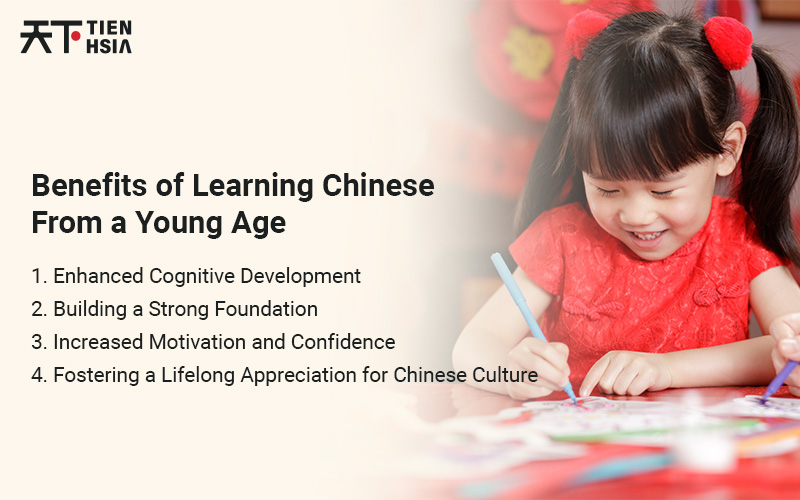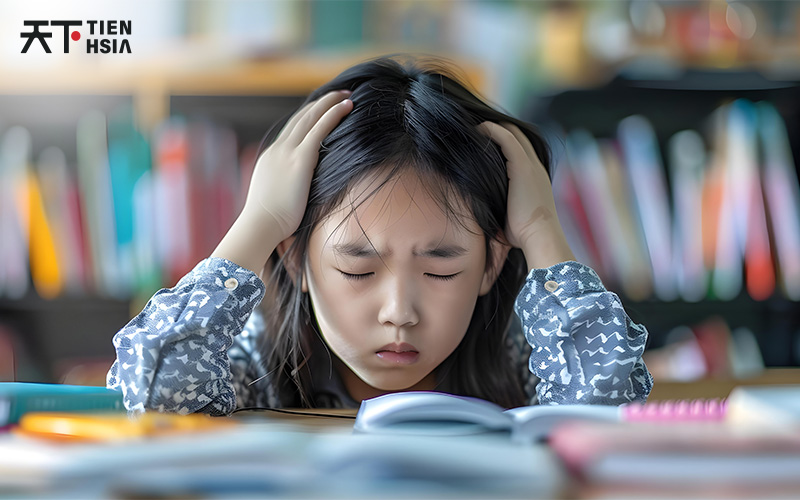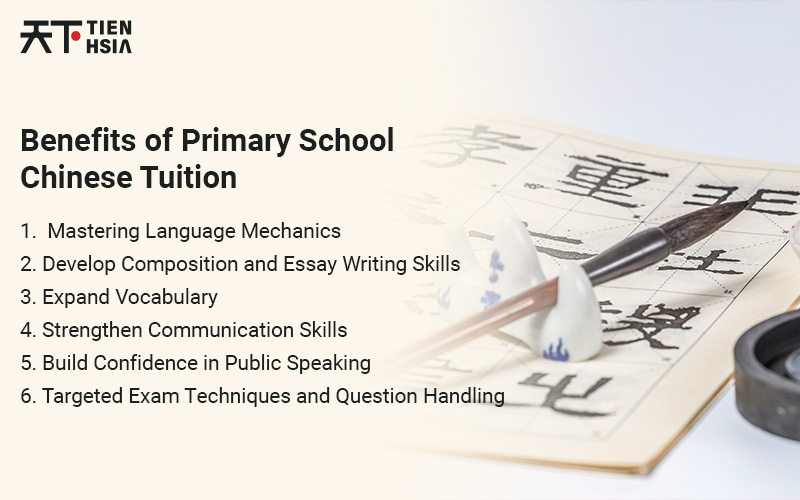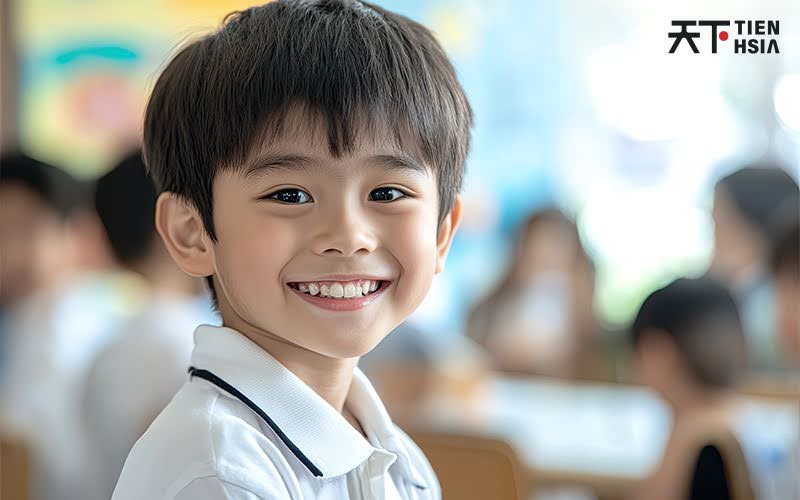May 6, 2025
In Singapore, mastering Chinese isn’t just about exams—it’s a way to stay connected to our cultural roots and succeed in a bilingual society. But for many children, it can be tough to learn, especially if they don’t speak it regularly at home.
Starting early makes all the difference. With the right support, kids can build a strong foundation and grow confident in using the language. In this article, we’ll explore how Chinese tuition helps pave the way for success in primary school—from the early years to PSLE and beyond.
Key Takeaways
|
Why Learning Chinese Early Matters for Primary School Success
The Benefits of Introducing Chinese Before Primary School

1. Enhanced Cognitive Development
Studies indicate that bilingualism boosts overall brain function, especially in young children. Learning a second language like Chinese enhances memory, problem-solving skills, and attention span. These cognitive benefits extend beyond language learning and can positively impact performance in other subjects, contributing to greater success in primary Chinese and beyond.
2. Building a Strong Foundation
Learning Chinese before Primary 1 (P1) begins gives children a head start in grasping the fundamentals, such as grammar, sentence structure, and core vocabulary. This early foundation makes it easier to handle more complex tasks like reading comprehension and composition writing once they begin formal education.
3. Increased Motivation and Confidence
Early exposure builds comfort. When children learn to speak and use Chinese before entering school, they become less afraid of making mistakes and more willing to engage with the language. This confidence translates into active classroom participation and steady progress through primary school.
4. Fostering a Lifelong Appreciation for Chinese Culture
Success in primary school Chinese isn’t just about grades—it’s about picking up a lifelong appreciation for the culture that will benefit them long after class ends. Through exposure to the richness of the language, stories, values, and customs, your child can gain a deeper appreciation for their heritage, enriching their educational journey and personal growth.
Common Obstacles Your Child May Face

While starting early offers many advantages, achieving success in primary Chinese still comes with its challenges—especially in a predominantly English-speaking environment. Here are some common obstacles many children in Singapore face when navigating a bilingual education.
1. Lack of Practice in Daily Life
With nearly half of Singapore residents speaking mainly English at home, children often don’t get to use their mother tongue outside of class. Without frequent usage, they forget vocabulary and struggle to apply what they’ve learnt. This lack of immersion also limits their exposure to natural sentence flow and pronunciation, making it harder to build fluency and confidence over time.
2. Seeing Chinese as a Chore
When studying becomes boring or stressful, students begin to associate learning Mandarin with pressure rather than curiosity. This mindset is common among those who lack foundational understanding or feel left behind. Without engaging lessons or positive reinforcement, they may even start avoiding the subject altogether. This further widens the learning gap and makes success in primary school Chinese even more difficult to achieve.
3. Difficulty in Contextual Understanding
Chinese expressions often rely on cultural or contextual meanings. Understanding idioms (成语) or interpreting implied meanings in passages is a challenge that school lessons may not have time to unpack fully. Without proper explanation and practice, children may struggle with comprehension and feel disconnected from what they’re reading or writing.
4. Fear of Making Mistakes or Feeling Embarrassed
The strong emphasis on academic perfection—and the fear of making mistakes—can cause children to hesitate or avoid speaking up. This is even more pronounced in Chinese, where its tonal nature means a small error in pronunciation can change the meaning of a word completely. As a result, many children become overly cautious, limiting their speaking practice and slowing their overall language development.
How Chinese Tuition is Crucial for Primary School Success

With so many obstacles to overcome, having additional support can be the difference-maker. This is where Chinese enrichment classes come in, providing personalised guidance, structured lessons, and valuable opportunities for practice. In this section, we’ll explore how the right tuition class can help your child achieve Chinese success at every stage of primary school.
How Does Primary School Chinese Tuition Help?

1. Master the Mechanics of the Language
P1 Chinese tuition gives students the time and space to understand the technical aspects of the language that are often rushed through in school. Tutors break down grammar rules, sentence structures, and character formation in a way that’s easy to follow. They will also impart effective language learning strategies to help primary school children write more accurately, speak more clearly, and build a solid base for success in Chinese.
2. Develop Composition and Essay Writing Skills
One of the biggest hurdles students face is composition writing. A comprehensive Chinese composition class offers step-by-step guidance in planning, structuring, and expressing ideas in written form. Students learn to organise their thoughts, use descriptive vocabulary, and apply relevant phrases or idioms effectively. Over time, they gain the confidence to write fluently and creatively—key components of primary Chinese success.
3. Expand Vocabulary
Tuition helps children grow their vocabulary through curated word lists, engaging reading materials, and focused practice. More importantly, they learn how to use these words in the right context—not just memorise them. This improves their overall understanding and helps them express themselves more clearly, whether they’re speaking or writing.
4. Strengthen Communication Skills
Due to time constraints in school and lack of regular practice, speaking and listening skills are often overlooked. Tuition classes place greater emphasis on oral practice, including show-and-tell, role-play, and interactive discussions. Students are encouraged to express themselves clearly, improve pronunciation, and respond confidently to questions—crucial for oral exams and real-life communication further down the line.
5. Build Confidence in Public Speaking
Many children shy away from speaking Chinese in front of others due to fear of embarrassment or making mistakes. Mandarin enrichment classes offer a supportive environment where they can practise speaking without fear of judgement. With patient guidance from encouraging teachers and small group settings, students gradually build the confidence to express their thoughts clearly, tackle oral exams with ease, and develop strong public speaking skills.
6. Targeted Exam Techniques and Question Handling
Chinese tuition provides focused training for exam preparation, especially in the upper primary years. Students are taught how to tackle different question types, manage their time wisely, and avoid common pitfalls. Whether it’s comprehension, close passages, or composition writing, tuition equips them with proven strategies to maximise their performance and achieve success in primary Chinese and the PSLE exams.
Choosing a Tuition Centre for Success in Primary School Chinese.

To enrich your child’s learning experience, choosing the right Singapore Chinese language centre is crucial. Here are a few key factors to consider:
1. Small Class Sizes
Smaller groups allow for more tailored support and closer teacher-student interaction. This allows tutors to quickly identify each child’s strengths and weaknesses, clarify doubts on the spot, and provide individualised feedback. This focused attention is especially valuable for children who may be struggling or are too shy to speak up in larger classroom settings.
2. Interactive and Engaging Lessons
Children learn best when they’re actively involved and enjoying the process. The best enrichment classes go beyond textbooks, incorporating activities like storytelling, drama, games, and cultural discussions. These fun and immersive methods make the language feel more relevant and help children retain what they learn more effectively.
3. Balanced Focus on All Language Skills
A well-rounded programme should develop all four core language skills—listening, speaking, reading, and writing. Some children may naturally be stronger in one area, so a balanced approach ensures no skill is left unrefined. This all-rounded development is essential for success in primary Chinese.
4. Continuous Feedback and Progress Tracking
Top tuition centres offer ongoing assessments and regular updates to keep parents informed. This allows tutors to adjust lesson plans according to the child’s progress and ensures that no learning gaps go unnoticed. It also gives parents a clearer picture of what their child is doing well and where extra support may be needed.
5. Close Alignment with the MOE Syllabus
A strong curriculum should mirror the MOE Chinese syllabus to reinforce what students are already learning in school. Centres that align closely with school content help children stay on track, reduce confusion, and improve performance in exams. This includes teaching relevant vocabulary, common composition themes, oral formats, and comprehension question types in PSLE Chinese.
6. All-Inclusive Enrolment System
Inclusivity is a key consideration when it comes to choosing the right tuition centre. At Tien Hsia Language School, we welcome students of all levels, not just high achievers. We aim to create a supportive environment where everyone—including students who may be struggling or starting late—has the chance to grow. With guidance, we believe that every primary school student can achieve meaningful progress and success in Chinese learning.
Tips for Parents Looking to Support Their Child
While tuition provides valuable support, a child’s success in learning primary school Chinese also depends heavily on what happens outside the classroom. Here are some practical tips to help you support your child’s journey at home.
1. Create a Chinese-Language Rich Environment
Let Mandarin be a part of your child’s everyday life—watch shows on Channel 8, play Mandarin nursery rhymes, read children’s books, or label household items with Chinese characters. These small changes create constant exposure, helping children hear and recognise words in different contexts. Over time, they’ll start to see Chinese as a living language rather than just a subject in school.
2. Set Realistic, Consistent Practice Goals
Short, regular practice sessions are more effective than occasional cramming. Just 10–15 minutes of reading, writing, or vocabulary review each day can lead to steady improvement. As parents, it’s important to help your child build a consistent yet manageable study routine—an essential aspect of primary Chinese success.
3. Show Interest in Their Learning Progress
Ask your child what they learnt during their enrichment classes and engage with the content together. Whether it’s celebrating a new milestone or rewarding them for a test well done, your interest reinforces the value of their effort and keeps them motivated to improve.
4. Communicate Regularly with Tutors and Teachers
Keep in regular contact with your child’s tuition teacher to stay updated on their progress, strengths, and areas where they may need more help. When you’re aware of what they’re working on in class, it’s easier to support their learning at home.
Frequently Asked Questions
1. What is the best age to start Chinese tuition?
Ideally, children should start learning Mandarin during their preschool years or by primary one. At this age, language acquisition happens more naturally, and students can develop foundational skills early for long-term success in primary school Chinese.
2. What makes Chinese tuition different from school lessons?
Tuition provides more personalised attention, allowing lessons to be tailored to each child’s unique learning needs. In P1 and primary 2 Chinese classes, tutors can also introduce more interactive and focused activities that may not be possible in larger school settings. This ensures more efficient learning and greater opportunities for success in primary school Chinese.
3. How can I tell if my child is struggling with Chinese, and what can I do to help?
Some signs that your child may be having difficulty include:
- A lack of interest in the subject
- Reluctance to do homework
- Frequent complaints about the subject
- Low confidence when speaking Chinese
- Receiving lower-than-expected marks in school exams
To help, start by having an open conversation with your child to understand what they’re finding difficult. From there, consider enrolling them in a supportive enrichment class where they can receive additional support.
Conclusion
Achieving primary Chinese success isn’t about rote memorisation or drilling vocabulary—it’s about building a strong, confident relationship with the language from a young age. Chinese tuition provides the structure, guidance, and motivation that many students need to thrive.
At Tien Hsia, we understand the unique challenges students face when learning Chinese in Singapore. That’s why our Mandarin enrichment classes are tailored to the MOE syllabus, combining interactive activities and effective exam strategies. Whether your child is just entering Primary 1 or preparing for the PSLE exams, we’re here to help them succeed.
Curious to see how it works?
Your child is welcome to attend a full trial lesson in one of our ongoing classes. After the session, you’ll have the opportunity to speak with the teacher to better understand how the class supports your child’s learning. The trial lesson will be complimentary if you decide not to enrol.
Contact us to learn more today.
